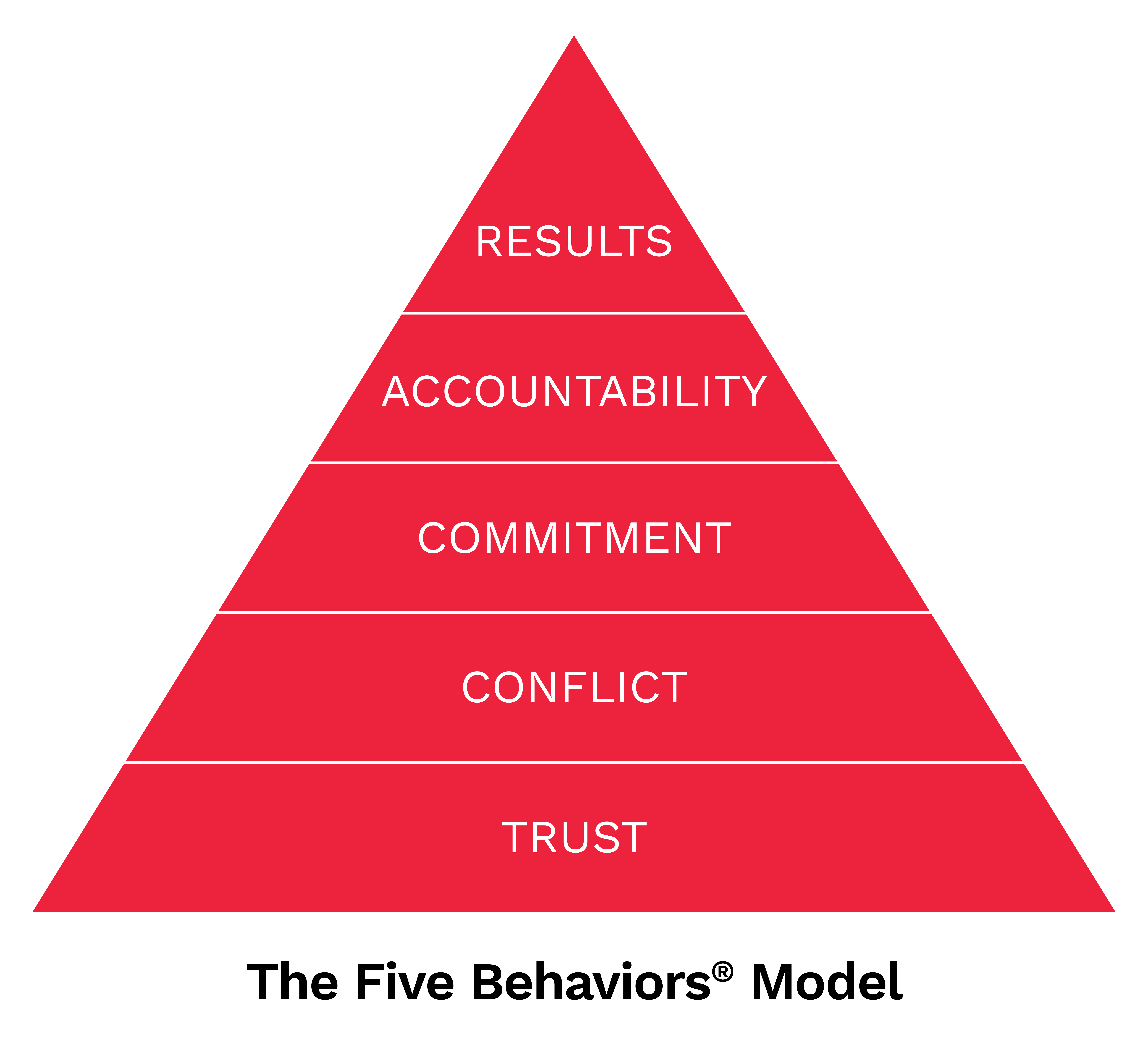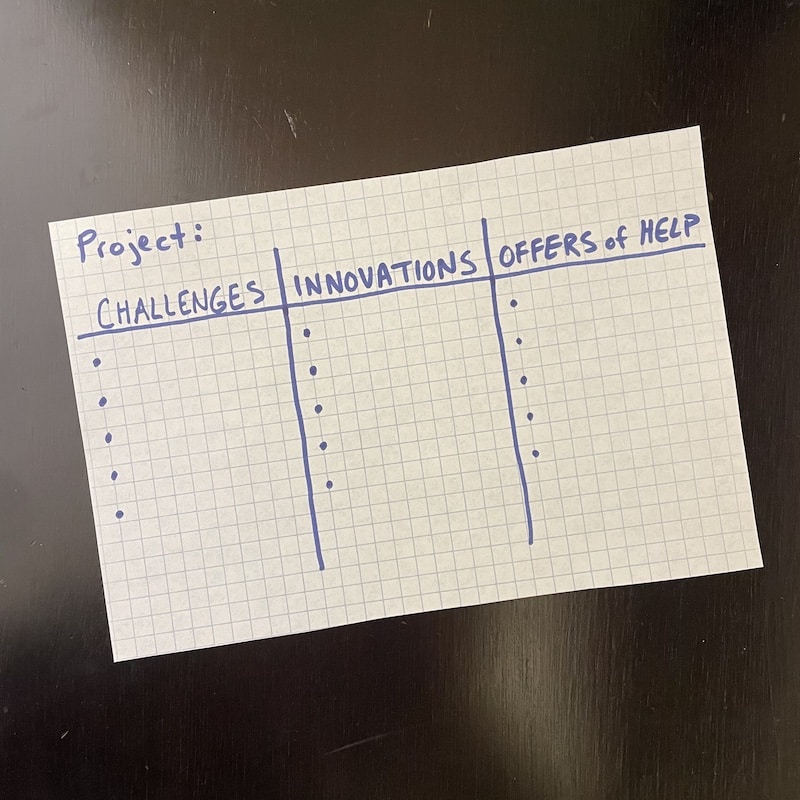
Commitment & accountability on teams
Every leader wants committed workers on their teams and those who understand how they are accountable for achieving results. However, often little attention is given as to how to obtain team commitment and encourage individual and team accountability. As Keith Ferrazzi wrote in A New Social Contract for Teams, “In focusing so heavily on what it means to be a great leader, companies have often lost sight of what it means to be a great team.”
What do we mean by commitment?
There is commitment to the team as a whole and to each other member. This requires clarity around decisions, offering feedback to each other, and moving forward with complete buy-in. Commitment does not mean that consensus is always necessary. It’s possible for team members to disagree on a decision and yet commit to it. As The Five Behaviors® Team Development states: “Great teams understand that they must be able to commit even when the outcome is uncertain and not everyone initially agrees.”
What do we mean by accountability?
Accountability is a habit you want team members to develop and share. Colleagues who can call their peers on performance or behaviors that might hurt the team show accountability. Those who don’t show generous, caring, trusting, and supportive behaviors are not showing accountability, but are rather being bullies or working only toward their own goals.
Team members who have high levels of accountability don’t just get their own work done, they are engaged with all the work of the team and try to keep the team’s energy high and outlook positive. They help each other succeed through feedback, assistance, coaching, positive recognition, and other supportive behaviors.
Signs of teams that lack commitment and accountability
If teams struggle with commitment and accountability, you might notice
- resentment among team members who have different standards of performance
- mediocre and uninspired performance
- confusion about direction and priorities
- missed opportunities due to excessive analysis or unnecessary delay
- repeated discussions about the same decisions or procedures
- second-guessing among team members
- dispirited and disinterested team members
- missed deadlines and deliverables
- excessive reliance on bureaucratic procedures and hierarchical structures
How do you grow a team’s commitment and accountability levels?
Before you know what changes need to be made, you need to assess where your team is now. We recommend using an assessment like The Five Behaviors Team Development. If you discover that the team lacks trust, then that is where the team needs to work before tackling issues of commitment and accountability. Team members have difficulty holding each other accountable if they don’t feel safe in the group. If the team is ready to tackle these two issues, an assessment will give them some language for discussions and tips for productive actions. The assessment might become the basis for a new set of norms, mores, or a social contract they want to establish.
The team commits as a group to the behaviors they want to prioritize and encourage. These should be behaviors that will have the biggest impact on the team’s performance. Keep this number small and return to it later to enlarge or alter the list.
Problem-solve together. Addressing problems as a team will give everyone practice using the behaviors they want to promote. Problems can include those the team has working together and those around achieving the results they have committed to. It can involve shifting the team’s priorities, finding ways to meet competing demands, or adapting to new needs of teammates.

Here’s an activity for teams to try. Create a document for one of their projects with three columns. One column is for challenges or struggles, one for innovations or achievements, and one for offers of help. Keeping their end goals in mind, team members can look for areas where they can individually and collectively make a difference on the project, share their individual challenges and achievements so far, get feedback, and then make new commitments or adapt those previously made.
Practice giving feedback. Some teams are great at building each other up, but have a hard time giving tough feedback. Other teams forget that positive feedback is important, too.
A two-round feedback activity can be helpful. During round one, everyone offers something they appreciate, admire, or want to celebrate about each teammate. In the second round, they offer one thing they’d like more of or less of from each teammate. Afterward, people can offer to coach each other or make commitments to different behaviors.

You’ll know the team has made progress if you start seeing these outcomes:
- Team members admit their mistakes and are willing to ask for and accept help.
- Members are meeting their goals and commitments.
- Members show less stress when holding a teammate accountable or when being held accountable themselves.
- Meetings have clear and specific resolutions and calls to action.
- Team members support group decisions even if they initially disagree.
- Team priorities are clear, even if they shift from time to time.
- Difficult conversations aren’t avoided.
- Members forget just who had the great idea or who made an error, and instead focus on their group’s achievements and share the wins.
- There is an increased sense of being part of a team and pride in their accomplishments as a team.
- Conflicts on the team feel less tense and more like finding the best path forward.
- Members care more about each other and enjoy their work more.
Focusing on how a team works together is as important as what the team does. Building cohesive teams that meet their commitments and hold themselves accountable will lead to positive team results.
Focusing on how a team works together is as important as what the team does.
Tools for team building
Leaders and managers need to place a special focus on addressing the teamwork skill gap to make hybrid offices successful.
To address issues of commitment on a team, you must first identify reasons for a lack of commitment and take these steps.
Teams that commit end discussions with clear and specific resolutions and calls to action. They know everyone had their voice heard and will support the decision, even if they initially disagreed. How can you, as an individual, help foster this kind of environment in team settings?
